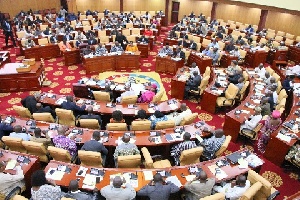We – at least I – have been calling for the amendment of Ghana’s Fourth-Republican Constitution in order to promptly proscribe the dual appointment of Members of Parliament of any ruling party as cabinet appointees for quite some time now (See “ GIMPA Rector Accuses Political Parties of Substandard MPs ” Modernghana.com 1/8/19).
Aside from the fact that such portfolio doubling makes for significant functional deficiencies – as cabinet appointees who also double as MPs cannot be expected to equally fulfill two full-time jobs at the same time – it has also led to the sort of double-salary drawing criminal cases of corruption that some of us in the media are still fiercely fighting to be brought before the law courts.
It is an unnecessary drain on the economy by a legislative pack whose general caliber is, at best, mediocre and at the worst, even as Prof. Philip Ebow Bondzie-Simpson, the Rector of the Ghana Institute of Management and Public Administration (GIMPA), recently observed, during a lecture themed “Constitutionalism in Ghana’s Fourth Republic: Towards a Functioning Performance,” sponsored by the Ghana Academy of Arts and Sciences (GAAS), patently unacceptable, dysfunctional and strategically regressive towards our national development efforts. I also could not agree more with Prof. Bondzie-Simpson that the qualifications needed to become an effective MP need to be clearly laid down and rigidly enforced by the leadership of the various political parties in the country.
Paradoxically, here, though, I have my own reservations, in view of the stark fact that constituents and eligible voters may sometimes have quite different criteria upon which they base their choice of who deserves to represent them and their interests. Such choice/choices are often dependent on who has been most serviceable and responsive to their needs and/or who has the right connections among the highest echelons of government to be able to bring home the bacon, as it were, or the direly needed development projects, programs and amenities into the community or the constituency. A striking case in point occurred in the Nkawkaw Constituency in 2008, when the local leaders of the then-ruling New Patriotic Party (NPP) opted for the fielding of a different candidate than the most popular aspirant, Mr. Seth Adjei-Baah, a non-college-educated classmate of yours truly, from our PERSCO days at Okwawu-Nkwatia.
Well, as fate would have it, the party’s candidate resoundingly lost to Mr. Adjei-Baah who was also popularly known as “Shaba.” I shall tell the Dear Reader, in due course, how my good friend got his Congo-sounding name in a separate column. But what is perhaps more significant to observe here is that in the end, the 50,000-plus votes by which the party’s sidelined aspirant defeated the mainline candidate could likely have carried then-Candidate Addo Dankwa Akufo-Addo over and above the votes garnered by his most formidable opponent, then-former Vice-President John Evans Atta-Mills, late, who defeated the candidate of the ruling party at the time by a slightly lower margin. Having been rudely shunted aside, my old friend “Shaba” decided to run as an Independent Candidate. That sealed the fate of Nana Akufo-Addo. I would shortly thereafter pen and publish an article pleading with my old friend to cross over to the NPP, but Mr. Adjei-Baah would be fiercely challenged by some Trokosi Nationalists who did not even belong to the Nkawkaw Constituency, as I vividly recall.
What is also clear is that, even as the immortalized Prof. Albert Einstein is well-known to have often admonished: “You simply can’t keep doing the same [wrongful] thing over and over again and expect to come up with different and better results each time around.” The fact of the matter is that 63-percent parliamentary absenteeism of MPs who also double as cabinet or deputy-cabinet members is a recipe for disaster. And until such wasteful political culture is promptly halted, substantive development and material progress would continue to elude Ghanaians. Now, that is a grim and sad reality that many of our freeloading politicians may be extremely reluctant to confront, but those of us at the short end of the draw or stick, as it were, ought to force the feet of these uppity freeloaders to the chastening fire of justice, accountability and fair play.
The era of the freeloading career politician also needs to be promptly halted. This means that once the legislature has been healthily and functionally decoupled from the executive, the next step on the agenda ought to be the imposition of a limit on how many terms a Ghanaian parliamentarian may serve his/her people and the nation in this Fourth Republic. We also need to heartily salute Odikro, the Civil Society Organization that, reportedly, conducted the survey indicating that the dual appointment of parliamentarians as ministers and deputy ministers of state costs the nation at least a whopping GH? 1.4 Million annually. This kind of waste is simply unacceptable by any measure.
*Visit my blog at: kwameokoampaahoofe.wordpress.com Ghanaffairs
By Kwame Okoampa-Ahoofe, Jr., PhD
English Department, SUNY-Nassau
Garden City, New York
E-mail: okoampaahoofe@optimum.net
Opinions of Sunday, 13 January 2019
Columnist: Kwame Okoampa-Ahoofe, Jr., Ph.D.















